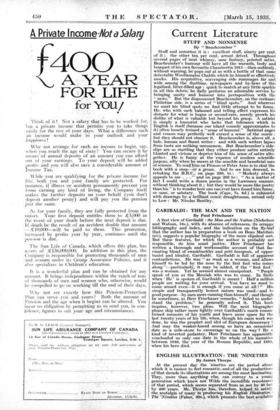GARIBALDI: THE MAN AND THE NATION By Paul Frischauer A
first view of Garibaldi : the Man and the Nation (Nicholson and Watson, 18s.), with its absence of references, its scrappy bibliography and index,- and the indication on the fly-leaf that the author has in preparation a book on Beau Marchais (sic), suggests a popular ,biography of the more slipshod sort. But these features, for which the author is probably not responsible, do him scant justice. Herr Frischauer has written a thorough and workmanlike account of that fas- cinating blend of swashbuckler and petit bourgeois, of oppor- tunist and idealist, Garibaldi. Garibaldi is full of apparent contradictions. He was "as weak as a woman,- and allows himself to be led by the nose by the first fool who comes along "—particularly, it may be added, if the "first fool" was a woman. Yet he seethed almost omnipotent. "People speak of you as the Messiah who Was to come. In Sicily when He is spoken of, Garibaldi is meant ! Half a million people are waiting for your arrival. You have no need to come armed even—it is enough if you come at all I" His simple and transparently honest nature was used—and to good purpose—hymen more cunning than himself ; and though he sometimes, as Herr Frischauer remarks, "failed to under- stand the problem," he generally solved it. This book inspires, however, two pleas. Will the next biographer please skip rather more lightly over Garibaldi's much-roman- ticized memoirs of his youth and leave more space for the last twenty years of his life, when, though his main work was done, he was the prophet and idol of European democracy ? And may the weaker-kneed among us have an- occasional date as a mile-stone to encourage us on the way ? By a kind of inverted pedantry, Herr Frischauer has apparently vouchsafed us only one- date in- the whole of his narrative between 1848, the year of the Roman Republic, and 1882, when his hero died.










































 Previous page
Previous page